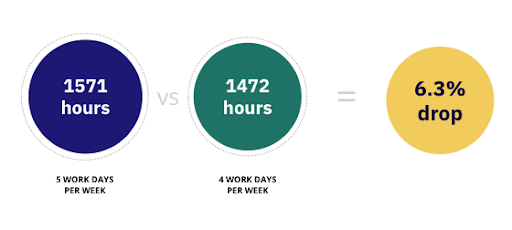
The case for a four day work week
Thursday is the new Friday
This article is based on the presentation given by Anthony Fox-Davies and Evgeniy Maslovskiy of SystemSeed at DrupalCon Europe 2022.
At SystemSeed, we believe in putting people at the center of our business strategy. As an end-to-end digital agency that focuses on social impact, we have a long history in Drupal and we're proud to work with organizations that make a positive impact in the world.
However, we also believe in making a positive impact on our employees internally. That's why we operate a 4-day work week (4DWW).
The big picture
A 4-day work week can be beneficial for both employees and employers. Studies show that businesses need a human-centric approach to worker engagement and if an employer doesn't provide it, another company will. This applies to full-time workers, part-time workers, parents and carers, digital nomads, and even people with side hustles.
Since the start of the Covid pandemic, we've all seen a lot of changes in working practices. The future of work is now even more firmly entwined with people, and how their companies treat them.
For agencies, it's essential that they put their people at the center of their business strategies. Agencies are their people because if you're not a product business, you are literally the sum of the output of the people in your company.
Happier people are more productive, give better service to clients, are more creative, and ultimately create greater profits.
Agencies are their people because if you're not a product business, you are literally the sum of the output of the people in your company.
How does it work for agencies Vs other types of business?
When it comes to working a four-day week, there are differences between product and service organizations.
In a product-focused company, you can leverage technology to bring down the marginal cost of doing business at scale. You can leverage IP by reusing code and building SaaS (software-as-a-service) platforms. You can effectively "copy and paste" your way to success. In contrast, service organizations need to be more adaptable and flexible, and that's where the 4DWW comes in.
At SystemSeed, we've found that the 4DWW works well for us. We've seen that our employees are happier, more productive, and give better service to clients.
We believe that the 4DWW can be applied to 90% of agency-type businesses and we're happy to share how we've made it work for us.
When we first considered moving from a 5-day week to a 4-day week, we needed to address our concerns as business owners, those of our team, and of our clients. Let's review them one by one.
Our concerns as business owners
Impact on profits
I'd be lying if I said business owners don't consider the impact on profit first when considering a 4DWW.
Before we implemented a four-day week, we tried adopting Google Time at SystemSeed and giving all team members one day a week to work on innovation. That didn't work out for us, but we got used to the fact that only 80% of each team member's time at work would be billed to clients. For us, that equated to 32 hrs per week.
So in theory, we surmised that if we canceled work on Fridays, and at the same time canceled all internal activities not related to client work, we would spend 100% of our time working billable hours, which should result in the same 32 hrs per week.
We checked this plan against real data from our time-tracking software. We compared a year of data from before and after the switch to the 4DWW with the same staff to draw accurate conclusions.
Below are the results for an average staff member. We found approximately a 6% reduction in billable hours, which is not too bad but still noticeable.
Digging into the data we found that in the past our staff worked an average of 33.5 hours a week instead of 32. Now in the 4-day week, they do 31 hours of billable work.
Also, during our data research, we made an interesting observation - our staff has shown a dramatic reduction in the number of sick days taken. In fact, it's about 2.5 times less than before, which is great for our team's productivity.
We all know that stress has a real impact on physical health. For us as business owners, fewer sick days means more predictable & stable project delivery. If an agency sees their staff taking a lot of sick days, it may be due to stress and burnout
Impact on project timelines
We were concerned that without working on Fridays we wouldn't be able to hit the performance metrics and project deadlines we had agreed upon with our clients.
What happened, in reality, is that our well-rested team performed better, delivering more for our clients at the same time and cost.
It was hard to pinpoint the data but that's what our general trends show. We have a suite of tools from time-tracking software, project management software, and an internal Ops tool we created called Clarity. They showed that our delivery speed kept meeting client expectations.
Regardless of what our team members choose to do over their 3-day weekend, they now come to work much more fresh and energetic. Before the switch our company mental health therapist warned us to look out for burnout. Now this problem has completely disappeared.
As a bonus, we don’t see tired faces on Monday anymore!
Impact on client support
Of course, we provide support to our clients every day of the week - including the weekends, in case of urgent incidents - so we need to have coverage for Fridays.
Our service level agreement deals with how quickly our team responds to incidents and our team needs to be ready to handle them.
How many times do you think we've had to respond to support issues over the weekend? It's only been twice, both for the same project and which were card fraud attempts that we were able to prevent. Apart from this specific issue, we've had zero other weekend support incidents.
Here's how we have achieved this:
Firstly, we have built our own resilient, self-healing hosting solution. Our hosting also covers high availability and multiple regions.
As well as hosting, we have sysadmin routines like proactive application, hosting, uptime monitoring, error tracking for frontend and backend, and more. Being proactive in our approach means we discover symptoms of potential issues before they blow up, and solve them during our work hours.
Secondly, we have mandatory test coverage & automated releases for each client project.
You may have heard the phrase "Don't Release On Fridays". That's because no one wants to be dealing with bugs over the weekend.
It follows that if you currently can't deploy on Fridays, then when you move to a 4DWW, you can't deploy on Thursdays.
Usually, the issues around Friday deploys only apply to teams who lack good DevOps and quality assurance structures in place. We feel that the only way to tackle deploying with confidence is to peer review code and ensure great test coverage and automated deployment processes. Then you can push to production any day of the week.
Staff concerns
Doing 40hrs of work in 32hrs
Believe it or not, when we told our team that they would be working fewer hours for the same money, they were concerned as well.
This is an important point to understand. The main premise of our 4-day week is to be more efficient and benefit from an extra day off each week - which adds up to 45 extra days off per year. So we had an expectation of more focused work from our team.
However, when we asked the team for feedback after moving to a 4-day week, they said two main things:
- They would probably not be able to maintain the same intensity for 5 days instead of 4.
- A 3-day weekend is sufficient for them to recover from a very full 4-days without feeling burnt out.
Meeting client expectations
In the past, some SystemSeeders used Fridays to catch up on client work, rather than spending the time on innovation. They weren't sure how they would manage, but as mentioned above, we are still hitting our targets so it hasn't become an issue.
Returning to a 5-day week
This was a genuine worry, as once they'd tried it, no member of the team wanted to give up their 3-day weekend.
We had told everyone that we would treat our 4DWW as an experiment. 18 months later and we're still doing it.
Moreover, now it’s now in our staff contracts and every Friday it still makes me smile that our experiment has been successful.
Feedback from our team:
We asked the team how a 4-day work week has changed their work and life, and the (anonymous) responses included:
"It feels like now I have time for everything I plan for”
“More time to focus on family and life admin”
“More energy and initiative at work”
“Much better work/life balance compared to many other experiments I've taken on”
“Gives me more personal time in the best sense”
“I think I do approximately the same work for 4 days as I did for 5”
“1 day per week when my son is at school and I don’t have to work - PEACE”
“I feel that after 3 days off my mind is fresh again and I’m really ready to work”
“No more burnout”
Client concerns
Understandably, our clients also had some concerns and you’ll notice that we had already dealt with them because they were similar to our concerns as business owners and those of our team:
Will it impact our project timelines?
If you've read this far, you already know the answer - no. As stated already the pace of project delivery has stayed the same.
Will it impact our budgets?
Our 4-day week has impacted client budgets, but not in the way you probably expect. It actually cost them less.
Remember that our billable hours have been reduced by 3-6% while the delivery has stayed the same. So clients now pay less to achieve the same result. Alternatively, they can achieve more for the same budget.
We think that our clients are the biggest beneficiaries of our move to a 4-day week.
Who will support us on Fridays?
We’ve already mentioned this as well. We reminded our clients about our contracted service level agreement, and what we do in DevOps that keeps our projects stable.
As we had evidence to show no incidents over weekends in the past, they were comfortable that it was unlikely that any would occur in the future.
Pitfalls
Change, however positive, usually has some downsides, so let's take a look at them:
We run Agile projects and had to move from 2-week sprints to 3 or 4-week sprints for most client projects because 8 working days over the usual 2-week sprint is too few to include all mandatory Agile ceremonies and still be productive.
We also canceled all internal events during work hours. We had to focus on billable time and there was no room for 20% Google Time anymore. A few months after the switch we re-introduced our 1hr weekly team town hall meeting as there was a demand from the team to share news and celebrate achievements together.
A couple of months after that we added short, fortnightly engineering culture & innovation meetings for the development team. Changing our working week was a good opportunity to re-evaluate our internal events, strip back, and focus on what was most essential to our business and the team.
In addition, we dramatically reduced team building events apart from hackathons, our annual retreat, and attending major conferences like Drupalcon. Any other events and activities were made optional outside of work hours.
For example, there was a demand to do open source contributions as a team, but we couldn’t find time within working hours - apart from cases when contribution work is a part of a paid project. Now we organize optional events once a month on a Friday for open source contributions. We started off by organizing a Drupal 10 readiness event with huge support from the Drupal community. For some of our team, it was their first contribution event and they really enjoyed it.
Advice for decision-makers
If you're thinking of trying a 4-day week in your organization, here's some advice based on our experience:
- Run a short trial over 4 weeks and treat it as an experiment. Don’t commit to the change yet. This will ensure that your team and clients don't worry too much about it.
- Talk to your clients openly and calm any fears they may have. Let them ask all their questions and explain that a better-rested team will deliver better results for them - without any increase in budget.
- Tell your team that if they are caught working on Fridays they will be fired! The 4DWW only works if people really take the extra time off from work. It would be the most ridiculous reason in the world to be fired and so far we haven’t caught anyone.
That’s all. It’s exactly what we did and it has worked well for us.
Warning - it's a trap!
As a responsible person I have to warn you - it’s a trap. Once you realize that the world doesn't collapse, everything still gets done, and your team is happier, you won't switch back.
Also, if you have a family, they will see you being calmer and happier at home. If you're still on the fence, do it for them and for the families of your team.
Agencies and product companies can make the same revenue, the same profit margins, and have a much healthier company culture by introducing a 4-day week.
In our case, we actually saw SystemSeed’s revenue grow by 100% from the previous year after introducing the 4DWW. So if you have a company and are looking for rapid growth, you don’t have to sacrifice growth for culture.
Impact on recruitment and retention
Does an extra 45 days' holiday a year help with recruitment? It certainly does.
Does it improve retention? The answer is yes and no. What we found was some people will still chase cash over culture. These are usually people who are climbing the career ladder and so are younger, maybe without kids or some of the other things that are typical in your 30s & 40s.
From personal experience, I recommend that younger people consider both money and culture in their careers. Burnout is no fun, at any age, whereas a positive work-life balance is always appreciated by people who have it.
The bottom line
In conclusion, the 4DWW is not only good for employees, but it's also good for employers. It's an intuitive and obvious concept that can be easily implemented in most businesses.
By putting people at the center of our business strategy, we've seen positive results at SystemSeed and we believe that other businesses can benefit from it as well.
We now help others to benefit from our experience, so if you'd like to know more, get in touch.



